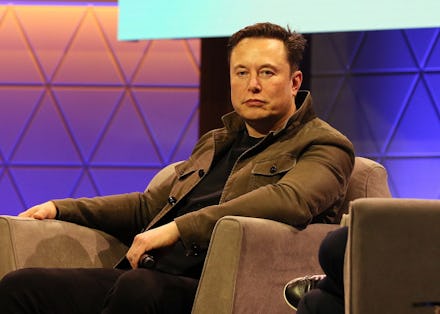Elon Musk wants to wire people's brains to fuse their minds with AI

Elon Musk is best known for founding electric car company Tesla, private aerospace manufacturer and space transportation services firm SpaceX, and posting dank memes on Twitter. But Musk has another project that he's thrown his support behind: a neurotechnology company called Neuralink. This week, the company announced that it is working on a "sewing machine-like" robot will be able to implant threads deep inside the human brain that could potentially help fuse our minds with artificial intelligence that can fill in gaps where our brains fall short.
According to scientists behind Neuralink's technology, the electrode-packed threads that the company plans to use are incredibly thin. We're talking between four and six micrometers (μm), which is about one-third the diameter of human hair. They will be embedded into the brain using the sewing machine contraption, which has to be careful as to not puncture blood vessels on the surface of the brain, and placed in close proximity to neurons. Once in place, sensors in the threads are used to capture data and activity spikes from those tiny building blocks of the brain. That information will be sent wirelessly to a chip outside of a person's brain. According to Musk, the company's current chip is capable of processing information from 1,000 times the number of electrodes that most current deep brain interfaces can achieve. That chip will be housed inside a pod that will also hold equipment needed for wireless communication and a battery to power it all. The pod will be located behind a person's ear.
While this all sounds like the type of sci-fi premise that is glazed over at the start of a movie about artificially-enhanced superhumans, the creators believe there are some very practical real-world applications. Musk and the scientists behind Neuralink hope that they may one day be able to help improve conditions from people who suffer from any number of ailments. In theory, the threads and chip could be the tools that help an amputee regain mobilty, restore sensory losses like vision or hearing, and even help to address neurological disorders like Parkinson's disease.
To be clear, there is a long way to go for that. This week, the company showed off its first results from tests conducted on laboratory rats and proved that it was possible to read information from 1,500 electrodes. That's a solid first step, but the success shown on lab rats may not translate to the human brain. The company is currently hopeful that it may start work on human subjects as early as the second quarter of this year, but there are still questions about how viable the technology is. Speaking to the New York Times, Professor Terry Sejnowski at the Salk Institute for Biological Studies noted that Neuralink still needed to prove that its threads can hold up over time. A salt solution found in the brain's environment can deteriorate plastics, which could present an obstacle to the long-term viability of the cellophane-like threads.
There's also the problem that, for the time being, the process of going through the thread embedding process seems pretty unpleasant. Getting the threads into a person's brain requires drilling holes in the skull and, much like other deep brain implants, requires the patient's head to be shaved. The company believes it will one day be able to avoid these issues by using lasers, but for now will have to stick with more traditional methods.
Neuralink is an incredibly ambitious project. That is a trademark of companies backed be Elon Musk. The problem is that his vision is often so lofty that it can be difficult for his teams to keep up with all of the things he promises. In 2015, he said all Teslas would be able to drive without human assistance in just two years. Four years later, we're still not there. In 2017, he claimed that SpaceX would send people to the moon in 2018. That didn't happen. Time will tell if Neuralink is the exception from the rule, but if you have have threads in your brain any time soon then Musk can rightly say "I told you so."